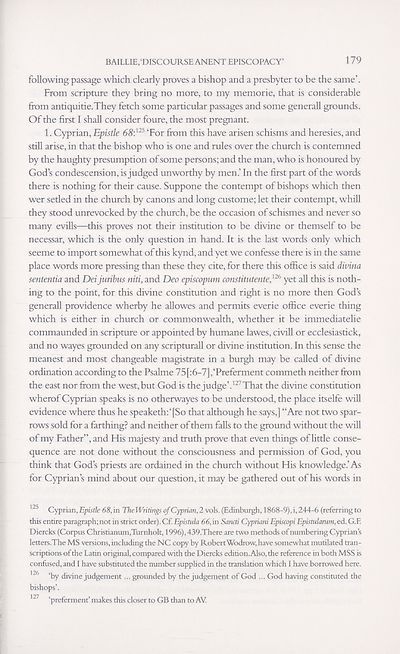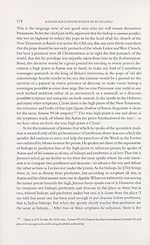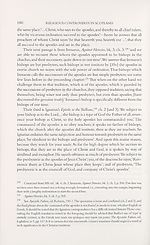Series 5 > Religious Controversy in Scotland 1625-1639
(194) Page 179
Download files
Complete book:
Individual page:
Thumbnail gallery: Grid view | List view

BAILLIE/DISCOURSE ANENT EPISCOPACY’
179
following passage which clearly proves a bishop and a presbyter to be the same’.
From scripture they bring no more, to my memorie, that is considerable
from antiquitie.They fetch some particular passages and some general! grounds.
Of the first I shall consider foure, the most pregnant.
1. Cyprian, Epistle 68:125 ‘For from this have arisen schisms and heresies, and
still arise, in that the bishop who is one and rules over the church is contemned
by the haughty presumption of some persons; and the man, who is honoured by
God’s condescension, is judged unworthy by men.’ In the first part of the words
there is nothing for their cause. Suppone the contempt of bishops which then
wer seded in the church by canons and long custome; let their contempt, whill
they stood unrevocked by the church, be the occasion of schismes and never so
many evills—this proves not their institution to be divine or themself to be
necessar, which is the only question in hand. It is the last words only which
seeme to import somewhat of this kynd, and yet we confesse there is in the same
place words more pressing than these they cite, for there this office is said divina
sententia and Dei juribus niti, and Deo episcopum constitutente,'26 yet all this is noth¬
ing to the point, for this divine constitution and right is no more then God’s
general! providence wherby he allowes and permits everie office everie thing
which is either in church or commonwealth, whether it be immediatelie
commaunded in scripture or appointed by humane lawes, civill or ecclesiastick,
and no wayes grounded on any scripturall or divine institution. In this sense the
meanest and most changeable magistrate in a burgh may be called of divine
ordination according to the Psalme 75[:6-7],‘Preferment commeth neither from
the east nor from the west, but God is the judge’.127 That the divine constitution
wherof Cyprian speaks is no otherwayes to be understood, the place itselfe will
evidence where thus he speaketh:‘[So that although he says,] “Are not two spar¬
rows sold for a farthing? and neither of them falls to the ground without the will
of my Father”, and His majesty and truth prove that even things of Htde conse¬
quence are not done without the consciousness and permission of God, you
think that God’s priests are ordained in the church without His knowledge.’As
for Cyprian’s mind about our question, it may be gathered out of his words in
125 Cyprian, Epistle 68, in The Writings of Cyprian, 2 vols. (Edinburgh, 1868-9), i, 244-6 (referring to
this entire paragraph; not in strict order). Cf. Epistula 66, in Sancti Cypriani Episcopi Epistularum, ed. G. F
Diercks (Corpus Christianum.Turnholt, 1996), 439.There are two methods of numbering Cyprian s
letters.The MS versions, including the NC copy by Robert Wodtow, have somewhat mutilated tran¬
scriptions of the Latin original, compared with the Diercks edition. Also, the reference in both MSS is
confused, and I have substituted the number supplied in the translation which I have borrowed here.
126 ‘by divine judgement ... grounded by the judgement of God ... God having constituted the
bishops’.
127 ‘preferment’ makes this closer to GB than to AV.
179
following passage which clearly proves a bishop and a presbyter to be the same’.
From scripture they bring no more, to my memorie, that is considerable
from antiquitie.They fetch some particular passages and some general! grounds.
Of the first I shall consider foure, the most pregnant.
1. Cyprian, Epistle 68:125 ‘For from this have arisen schisms and heresies, and
still arise, in that the bishop who is one and rules over the church is contemned
by the haughty presumption of some persons; and the man, who is honoured by
God’s condescension, is judged unworthy by men.’ In the first part of the words
there is nothing for their cause. Suppone the contempt of bishops which then
wer seded in the church by canons and long custome; let their contempt, whill
they stood unrevocked by the church, be the occasion of schismes and never so
many evills—this proves not their institution to be divine or themself to be
necessar, which is the only question in hand. It is the last words only which
seeme to import somewhat of this kynd, and yet we confesse there is in the same
place words more pressing than these they cite, for there this office is said divina
sententia and Dei juribus niti, and Deo episcopum constitutente,'26 yet all this is noth¬
ing to the point, for this divine constitution and right is no more then God’s
general! providence wherby he allowes and permits everie office everie thing
which is either in church or commonwealth, whether it be immediatelie
commaunded in scripture or appointed by humane lawes, civill or ecclesiastick,
and no wayes grounded on any scripturall or divine institution. In this sense the
meanest and most changeable magistrate in a burgh may be called of divine
ordination according to the Psalme 75[:6-7],‘Preferment commeth neither from
the east nor from the west, but God is the judge’.127 That the divine constitution
wherof Cyprian speaks is no otherwayes to be understood, the place itselfe will
evidence where thus he speaketh:‘[So that although he says,] “Are not two spar¬
rows sold for a farthing? and neither of them falls to the ground without the will
of my Father”, and His majesty and truth prove that even things of Htde conse¬
quence are not done without the consciousness and permission of God, you
think that God’s priests are ordained in the church without His knowledge.’As
for Cyprian’s mind about our question, it may be gathered out of his words in
125 Cyprian, Epistle 68, in The Writings of Cyprian, 2 vols. (Edinburgh, 1868-9), i, 244-6 (referring to
this entire paragraph; not in strict order). Cf. Epistula 66, in Sancti Cypriani Episcopi Epistularum, ed. G. F
Diercks (Corpus Christianum.Turnholt, 1996), 439.There are two methods of numbering Cyprian s
letters.The MS versions, including the NC copy by Robert Wodtow, have somewhat mutilated tran¬
scriptions of the Latin original, compared with the Diercks edition. Also, the reference in both MSS is
confused, and I have substituted the number supplied in the translation which I have borrowed here.
126 ‘by divine judgement ... grounded by the judgement of God ... God having constituted the
bishops’.
127 ‘preferment’ makes this closer to GB than to AV.
Set display mode to:
![]() Universal Viewer |
Universal Viewer | ![]() Mirador |
Large image | Transcription
Mirador |
Large image | Transcription
Images and transcriptions on this page, including medium image downloads, may be used under the Creative Commons Attribution 4.0 International Licence unless otherwise stated. ![]()
| Scottish History Society volumes > Series 5 > Religious Controversy in Scotland 1625-1639 > (194) Page 179 |
|---|
| Permanent URL | https://digital.nls.uk/127330293 |
|---|
| Description | Over 180 volumes, published by the Scottish History Society, containing original sources on Scotland's history and people. With a wide range of subjects, the books collectively cover all periods from the 12th to 20th centuries, and reflect changing trends in Scottish history. Sources are accompanied by scholarly interpretation, references and bibliographies. Volumes are usually published annually, and more digitised volumes will be added as they become available. |
|---|


